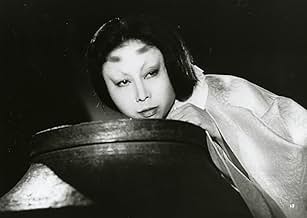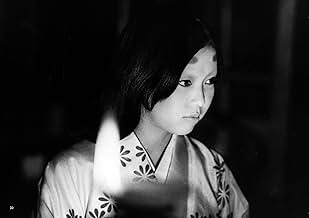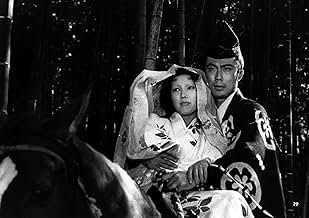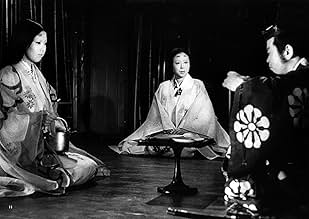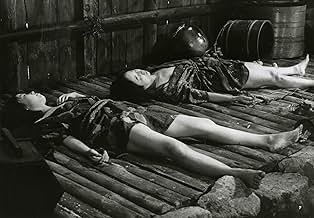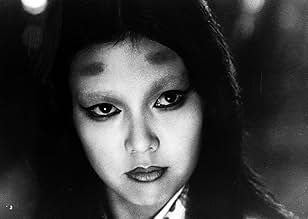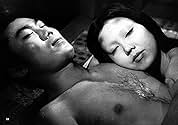AVALIAÇÃO DA IMDb
7,7/10
9,4 mil
SUA AVALIAÇÃO
Duas mulheres são estupradas e mortas por soldados samurais. Logo elas reaparecem como fantasmas vingativos que seduzem e matam brutalmente os samurais que passam.Duas mulheres são estupradas e mortas por soldados samurais. Logo elas reaparecem como fantasmas vingativos que seduzem e matam brutalmente os samurais que passam.Duas mulheres são estupradas e mortas por soldados samurais. Logo elas reaparecem como fantasmas vingativos que seduzem e matam brutalmente os samurais que passam.
- Prêmios
- 2 vitórias no total
Avaliações em destaque
Although somewhat similar in both tone and presentation to director Kaneto Shindō's earlier masterpiece Onibaba (1964), Kuroneko (1968) - which translates roughly as "the black cat" - adds a more theatrical, expressionistic element to the overall design of the film, which here works towards reinforcing the more obvious spiritual/supernatural elements of the story and that unforgettable sense of nocturnal, dreamlike abstraction. As is often the case with Japanese supernatural horror stories, the plot of the film is an incredibly simple and moralistic one, dealing primarily with the notions of revenge and retribution re-cast as a pointed supernatural metaphor, with much emphasis placed on the overriding ideas of coincidence, karma and fate. In keeping with these particular ideas, Shindō creates a slow and atmospheric work that takes full advantage of the stark, unearthly ambiance suggested by the high-contrast black and white cinematography, which really helps to further underline the creation of this barren, war-torn period setting, filled with danger and despair.
Unlike Shindō's two most famous films of this period, the aforementioned Onibaba and his earlier classic The Naked Island (1960), Kuroneko sees the director moving even further away from his earlier interest in naturalistic environments - and the use of those unforgettable landscapes to underline the unspoken elements of the drama - and instead illustrates an interest in studio-based production, in a clear attempt to capture the sense of desolate, otherworldliness presented by the claustrophobic netherworld that the spirits of the film inhabit. By mixing these two styles together - cutting from a location to a studio to illustrate the characters moving between the two different worlds of the film - Shindō is able to create a further degree of heightened atmosphere, tension and theatrical abstraction that is further illustrated by the expressive use of costumes and kabuki-like make-up effects, combined with the director's continuing experiments with sound design and atonal musical composition.
The harsh tone of the film is established right from the very beginning, with the opening scene still standing as one of the most shocking and memorable of 1960's cinema, as Shindō takes us right back to the unforgettable images of Onibaba and a scene of deplorable brutality that will reverberate throughout the rest of the film. Here, we fade in on a shot of a small hut surrounded by long billowing grass and tall, leafy trees in the heart of rural Kyoto. Shindō holds the shot for an incredibly long time, establishing the incredibly slow and deliberate pace that the rest of the film will employ, before we finally see an armed warrior emerging from the bushes. His movements are slow and furtive, as he stealthily moves closer to the hut looking for food and supplies. Eventually, more soldiers appear, phantom-like from foliage and move closer towards the hut. Sleeping inside are an old woman and her daughter in law. The soldiers descend on the hut, much to the shock and surprise of the two women who try desperately to force the intruders away; however, eventually realising that the supply rations of the hut are meagre and unsatisfactory the soldiers gang-rape the two women, and burn their hut to the ground.
Here, Shindō films a violent scene that could have easily become lurid and exploitative with a pervasive sensitivity; establishing the brutality to come before cutting to an exterior shot that he once again holds for a number of minutes, creating a tragic subversion of the previously tranquil setting that opened the film. As the smoke begins to pour from the hut and the soldiers, once again, ghost-like and oppressive, filter back into the tree line we know that the film has crossed a threshold into darker territory from which it simply cannot return. With the thematic elements of this tragic, dramatic set up - combined with the period in which the film is set and the approach of the director - you can certainly see positive similarities to Ingmar Bergman's punishing rape/revenge drama The Virgin Spring (1960). However, whereas Bergman used this aspect of the plot to riff on spirituality and a suffocating, existentialist riddle; Shindō is instead more interested in mining a path of slow-building terror and blood-thirsty retribution.
To reveal any more would spoil the impact of the film and the odd, erotic atmosphere that Shindō skilfully creates through the combination of stylised photography, choreography, production design, lighting, music and editing. It is at times reminiscent of Mario Bava's excellent Gothic horror films The Mask of Satan (1960) and Kill, Baby... Kill (1966) in regards to the evocative stylisations and emphasis on mood and design; though also bringing to mind the brilliance of Masaki Kobayashi's masterpiece Kwaidan (1964), in particular the segment entitled "The Woman of the Snow". If you're already familiar with Onibaba (one of the greatest films ever made), then you'll have some idea of what to expect from the direction of Kuroneko, with the incredibly atmospheric use of black and white cinematography - making full use of that expansive, Cinemascope frame - augmented by an intelligent approach to production and location design and the slow, evocative atmosphere of nocturnal nightmare and fever dream obsession created by the story itself.
Unlike Shindō's two most famous films of this period, the aforementioned Onibaba and his earlier classic The Naked Island (1960), Kuroneko sees the director moving even further away from his earlier interest in naturalistic environments - and the use of those unforgettable landscapes to underline the unspoken elements of the drama - and instead illustrates an interest in studio-based production, in a clear attempt to capture the sense of desolate, otherworldliness presented by the claustrophobic netherworld that the spirits of the film inhabit. By mixing these two styles together - cutting from a location to a studio to illustrate the characters moving between the two different worlds of the film - Shindō is able to create a further degree of heightened atmosphere, tension and theatrical abstraction that is further illustrated by the expressive use of costumes and kabuki-like make-up effects, combined with the director's continuing experiments with sound design and atonal musical composition.
The harsh tone of the film is established right from the very beginning, with the opening scene still standing as one of the most shocking and memorable of 1960's cinema, as Shindō takes us right back to the unforgettable images of Onibaba and a scene of deplorable brutality that will reverberate throughout the rest of the film. Here, we fade in on a shot of a small hut surrounded by long billowing grass and tall, leafy trees in the heart of rural Kyoto. Shindō holds the shot for an incredibly long time, establishing the incredibly slow and deliberate pace that the rest of the film will employ, before we finally see an armed warrior emerging from the bushes. His movements are slow and furtive, as he stealthily moves closer to the hut looking for food and supplies. Eventually, more soldiers appear, phantom-like from foliage and move closer towards the hut. Sleeping inside are an old woman and her daughter in law. The soldiers descend on the hut, much to the shock and surprise of the two women who try desperately to force the intruders away; however, eventually realising that the supply rations of the hut are meagre and unsatisfactory the soldiers gang-rape the two women, and burn their hut to the ground.
Here, Shindō films a violent scene that could have easily become lurid and exploitative with a pervasive sensitivity; establishing the brutality to come before cutting to an exterior shot that he once again holds for a number of minutes, creating a tragic subversion of the previously tranquil setting that opened the film. As the smoke begins to pour from the hut and the soldiers, once again, ghost-like and oppressive, filter back into the tree line we know that the film has crossed a threshold into darker territory from which it simply cannot return. With the thematic elements of this tragic, dramatic set up - combined with the period in which the film is set and the approach of the director - you can certainly see positive similarities to Ingmar Bergman's punishing rape/revenge drama The Virgin Spring (1960). However, whereas Bergman used this aspect of the plot to riff on spirituality and a suffocating, existentialist riddle; Shindō is instead more interested in mining a path of slow-building terror and blood-thirsty retribution.
To reveal any more would spoil the impact of the film and the odd, erotic atmosphere that Shindō skilfully creates through the combination of stylised photography, choreography, production design, lighting, music and editing. It is at times reminiscent of Mario Bava's excellent Gothic horror films The Mask of Satan (1960) and Kill, Baby... Kill (1966) in regards to the evocative stylisations and emphasis on mood and design; though also bringing to mind the brilliance of Masaki Kobayashi's masterpiece Kwaidan (1964), in particular the segment entitled "The Woman of the Snow". If you're already familiar with Onibaba (one of the greatest films ever made), then you'll have some idea of what to expect from the direction of Kuroneko, with the incredibly atmospheric use of black and white cinematography - making full use of that expansive, Cinemascope frame - augmented by an intelligent approach to production and location design and the slow, evocative atmosphere of nocturnal nightmare and fever dream obsession created by the story itself.
Director Kaneto Shindô is most famous for his 1964 ghost story Onibaba; and anyone that enjoyed that film will certainly enjoy this one. The two films are very similar in style, and that's a good thing for both as the thick and surreal atmosphere created by the director creates a perfect atmosphere for a horror story to take place in. The title of the film translates in English to 'The Black Cat' - a staple of the horror genre ever since Edgar Allen Poe penned his classic story; although this film has nothing to do with the writings of Poe and is an original story written by the director. The film takes place in feudal Japan and our focus is on a mother and daughter-in-law living alone in the swamp. Its war time and all the samurais are out fighting. However, one day a group of them happen on the pair and after eating their food, the samurai's rape the women. Shortly thereafter, many samurai are being found dead in the area; they are drained of blood with their throats ripped out. Naturally the lord of the land comes to the conclusion that a monster is behind it, and sends a young hero to deal with the problem.
Kaneto Shindô is keen to fill his film with rich symbolism and striking visuals; but also finds time for some visceral horror. The opening scenes are shocking and later the films builds into some truly memorable and surreal sequences that, when combined with the atmosphere, do manage to be quite frightening. The swamp location is a really great place for the film to take place also; and the director makes the best of it, especially during the parts in which the younger of the two women is leading the stray samurai's to their death. The film is more than just the central story; and we also follow things going on around it; such as the eventual hero's fight that earned him the right to seek out and kill the demons. The central story is definitely the most interesting, however, and while the sub plots are not boring; I did mostly find myself waiting for the film to get back on track. The way that the story builds into the end, which really brings all the stray subplots together, is really good and the film ends on a very strong note. Overall, The Black Cat is not quite as great as the director's masterpiece Onibaba; but it's certainly a very good horror film.
Kaneto Shindô is keen to fill his film with rich symbolism and striking visuals; but also finds time for some visceral horror. The opening scenes are shocking and later the films builds into some truly memorable and surreal sequences that, when combined with the atmosphere, do manage to be quite frightening. The swamp location is a really great place for the film to take place also; and the director makes the best of it, especially during the parts in which the younger of the two women is leading the stray samurai's to their death. The film is more than just the central story; and we also follow things going on around it; such as the eventual hero's fight that earned him the right to seek out and kill the demons. The central story is definitely the most interesting, however, and while the sub plots are not boring; I did mostly find myself waiting for the film to get back on track. The way that the story builds into the end, which really brings all the stray subplots together, is really good and the film ends on a very strong note. Overall, The Black Cat is not quite as great as the director's masterpiece Onibaba; but it's certainly a very good horror film.
Some obvious similarities to Shindo's earlier ONIBABA, as a woman and her mother-in-law are raped by samurai, and turn to supernatural forces to seek their revenge. Shindo uses an impressive array of tricks to maintain the unsettling, creepy atmosphere -- sparse Noh-style staging, bold chiaroscuro lighting, avant-garde soundtrack, abrupt time cuts, wire work, superimpositions and other special effects. It's a very atmospheric kaidan, almost Gothic in tone. Rape is of course a disturbingly common occurrence in Japanese cinema, but here Shindo uses it as the groundwork for a decidedly feminist agenda. The film does have a few pacing issues, particular during the erotic portions in the middle (although some of it is lovely). I thought more could have been done with this story, but the visual aspects and the mood make it memorable.
THE SYNOPSIS In warring feudal Japan, a group of marauding Samurai seeking food exits the forest where they come across a house that should have what they require. On entering the house they find it has what they want and a lot more
.it has women too. The inhabitants an elderly woman and her daughter in law are both subjected to continuous rape as each Samurai takes their turn, the others plunder the women's food stocks.After the Samurai have satiated their appetites,they leave the women, now unconscious for dead and set fire to their home as they flee.When the fire eventually burns out all we see are the burned and battered bodies of the women and their helpless black kitten as it licks their wounds.
Rajomon Gate .a Samurai approaches on horseback and is met by a spectral vision of a woman, who tells him she is too afraid to make her journey home because she has to pass the Bamboo Grove, which is a haven for bandits and highwaymen. The Samurai agrees to accompany her to her home, where he is plied with sake. The Daughter in laws husband Hachi, we learn has been at war for three years and has still not returned The daughter in law then proceeds to seduce the Samurai, before she brutally attacks him, devouring his throat and sucking his blood ..for we learn that the two women are in fact the newly embodied spirits of the dead women murdered by the Samurai who have made a pact with the Evil Gods/Spirits, who have allowed them life, on condition that they murder all Samurai who pass their way.
Far to the East, a sole warrior named Hachi is all that remains after a massive and bloody battle.Hachi returns home to find his home burned and his family missing, he seeks employment from the Samurai leader at Rajomon Gate named Raiko, who after hearing Hachi's brave stories takes him on. Hachi's first task is to rid the area of the spectral beasts that have been claiming the lives of his warriors ..and so Hachi sets off unknowingly to kill his own family.
THE REVIEW Unquestionably a companion piece to Onibaba, a film by the same Director it was made to cash in on the success of Onibaba which had been met by a wave of good criticism in the west .and also because Shindo's other contemporary works had been less critically received mainly due to their overtly sexual content. Kiyomi Kuroda's award winning cinematography sets the tone for this film, its Chiaroscuro/Noir visuals are nothing short of breathtaking. The underlying tragic story of lost love is also dealt with brilliantly by Shindo who is on fine form again .the story is compelling except for the first twenty minutes which became a bit repetitive as Samurai after Samurai was seduced and killed by the women, but this ploy was used to bring the story forward so I wont criticize too much.All in all, a worthwhile buy if you like Onibaba or Asian Cinema,but the DVD despite the films stunning print is very bare.
Rajomon Gate .a Samurai approaches on horseback and is met by a spectral vision of a woman, who tells him she is too afraid to make her journey home because she has to pass the Bamboo Grove, which is a haven for bandits and highwaymen. The Samurai agrees to accompany her to her home, where he is plied with sake. The Daughter in laws husband Hachi, we learn has been at war for three years and has still not returned The daughter in law then proceeds to seduce the Samurai, before she brutally attacks him, devouring his throat and sucking his blood ..for we learn that the two women are in fact the newly embodied spirits of the dead women murdered by the Samurai who have made a pact with the Evil Gods/Spirits, who have allowed them life, on condition that they murder all Samurai who pass their way.
Far to the East, a sole warrior named Hachi is all that remains after a massive and bloody battle.Hachi returns home to find his home burned and his family missing, he seeks employment from the Samurai leader at Rajomon Gate named Raiko, who after hearing Hachi's brave stories takes him on. Hachi's first task is to rid the area of the spectral beasts that have been claiming the lives of his warriors ..and so Hachi sets off unknowingly to kill his own family.
THE REVIEW Unquestionably a companion piece to Onibaba, a film by the same Director it was made to cash in on the success of Onibaba which had been met by a wave of good criticism in the west .and also because Shindo's other contemporary works had been less critically received mainly due to their overtly sexual content. Kiyomi Kuroda's award winning cinematography sets the tone for this film, its Chiaroscuro/Noir visuals are nothing short of breathtaking. The underlying tragic story of lost love is also dealt with brilliantly by Shindo who is on fine form again .the story is compelling except for the first twenty minutes which became a bit repetitive as Samurai after Samurai was seduced and killed by the women, but this ploy was used to bring the story forward so I wont criticize too much.All in all, a worthwhile buy if you like Onibaba or Asian Cinema,but the DVD despite the films stunning print is very bare.
This is Japanese period piece of supernatural horror directed by Kaneto Shindo (Onibaba), based on a traditional folktale. During a time of widespread warfare, a woman (Nobuko Otowa) lives in an isolated farmhouse with her daughter-in-law Shige (Kiwako Taichi). The woman's son, and Shige's husband, Gintoki (Kichiemon Nakamura) have been conscripted in the war, so the ladies are alone when a band of samurai pass by and decide to raid the house for food, only to assault and kill both women while they're at it. Several years later, many of those samurai have risen to positions of importance, only a pair of ghostly women have begun killing them one by one. Gintoki, unaware of the fates of his wife and mother, is ordered to investigate the killings.
Like Shindo's earlier Onibaba, this features terrific B&W cinematography and very effective atmosphere. The acting by the three leads is also very good. This would make a great triple bill with Onibaba and Kwaidan.
Like Shindo's earlier Onibaba, this features terrific B&W cinematography and very effective atmosphere. The acting by the three leads is also very good. This would make a great triple bill with Onibaba and Kwaidan.
Você sabia?
- CuriosidadesThe movie was placed in competition at the 1968 Cannes Film Festival, but the festival was canceled due to the civil unrest events of May 1968 in France.
- Erros de gravaçãoWhen the cat crawls over the bodies after the fire, the mother can be seen to breathe.
- ConexõesFeatured in Ebert Presents: At the Movies: Episode #2.15 (2011)
Principais escolhas
Faça login para avaliar e ver a lista de recomendações personalizadas
- How long is Black Cat?Fornecido pela Alexa
Detalhes
- Data de lançamento
- País de origem
- Idioma
- Também conhecido como
- Kuroneko, el grito del sexo
- Empresa de produção
- Consulte mais créditos da empresa na IMDbPro
- Tempo de duração1 hora 39 minutos
- Cor
- Proporção
- 2.35 : 1
Contribua para esta página
Sugerir uma alteração ou adicionar conteúdo ausente

Principal brecha
By what name was O Gato Preto (1968) officially released in India in English?
Responda

